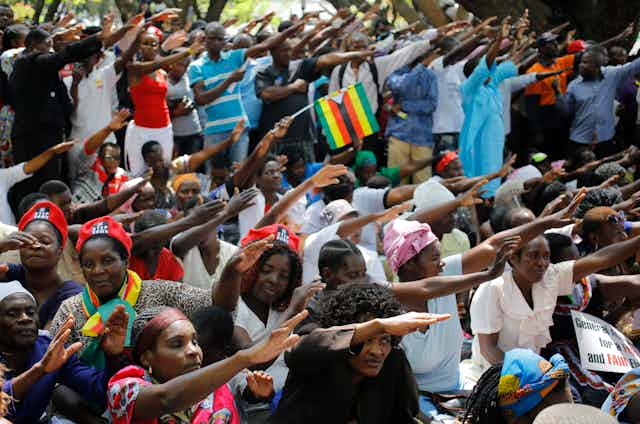Words and phrases aren’t empty vessels – they carry the weight of human experience, and the hopes they generate help to set actual agendas.
I was reminded of this as I listened to Robert Mugabe’s now infamous “address to the nation” recorded in State House the previous Sunday evening, November 19, 2017, delivered at the midpoint of the six-day transitional drama in Zimbabwe. He commented on the developments swirling around him, and gave his reasons for refusing to step down.
Drawing on a vocabulary from the early 20th century, and delivered in his trademark old-world diction, his remarks could well have been directed at the arch-imperialist Cecil John Rhodes – one of the few people in history to have a country named after him during his own lifetime – rather than the people of Zimbabwe.
At one point he said:
The congress is due in a few weeks from now. I will preside over its processes, which must not be prepossessed by any acts calculated to undermine it or compromise the outcomes in the eyes of the public.
In one reading, the speech seems quaint, even preposterous. In another, Mugabe’s return to the language of the past makes perfect sense.
British colony
The British colony known as “Southern Rhodesia” was founded during a period of intense political ferment. In the 1920s and 1930s, when its formal borders were being finalised, increasingly self-assertive Anglophone colonies – Australia, Canada, New Zealand and South Africa – were seeking a new relationship with Britain.
They emerged from this period as “Dominions of the British Crown”, to use the long-hand phrase. This meant a nominal weakening of Whitehall’s hold over their domestic affairs. But their foreign policy and their capacity to make war remained closely tied to Britain’s imperial ambitions.
The 200 000-odd whites of largely British descent who occupied Southern Rhodesia at the time were less ambitious (and less powerful) than their settler counterparts in neighbouring South Africa. But, seizing the spirit of the times, and using its language, the British government granted them “self-government” in 1923. This sealed the exclusion of the majority from governing their own country. And, it gave the white minority the right to set the rules on two crucial issues: race discrimination, as well as access to land.
After the Second World War, in the face of calls for liberation from white domination, the settlers’ struggle to retain this decision-making power, together with the country’s contested constitutional link to London, provided the platform for Robert Mugabe’s own career, as school teacher, then as freedom fighter, and finally as president.
Seen against this background, the legalisms and concordances of the “address to the nation” are understandable because they reflect the language in which the struggle for Zimbabwe was conducted.
The trap of key words
Did Mugabe intend to show that the hallmarks of imperial government had not been eroded after almost 40 years of majority rule? Or is there a more obvious explanation: that Mugabe (or his speech writers) had failed to appreciate how political language had changed during the 37 years of his presidency?
It seems difficult to believe the first, so the second explanation seems plausible. This is because the language that has linked the power of neoliberal economics to democratic transformation was entirely absent from Mugabe’s remarks. Keywords – terms like “governance”, “accountability”, “deliverables” and “transparency” were notably absent.
But over the past week, as the events have unfolded, these (and similar terms) have crept ever deeper into conversations about Zimbabwe. As punditry grows over the country’s future, it is fair to believe that their hold on the discourse around its future, both within and outside the country, will tighten further.
The core problem is that these words, and the diction in which they are used, offer a one-size-fits-all approach to solving complex sociopolitical situations. As a result, the single greatest failure of contemporary punditry is the refusal to recognise that context matters.
For the think-tank community these words, and the concordances in which they are embedded, promise a road map towards a bright new future. This is because the language appears to be freed from the strictures of ideology.
It isn’t, of course. Like all ideologies, it is nothing more than a set of ideas and beliefs that relies on commmon-sensical explanations of social reality. It is certainly not value-free.
Events over the past two decades – civil wars, Brexit, Trumpism – have tarnished the claims to the truth of neoliberalism.
This brings us back to the conversation about the future of Zimbabwe. The notion that “economic liberalisation” will offer the country a quick and easy pathway to a prosperous future is simplistic and misleading.

